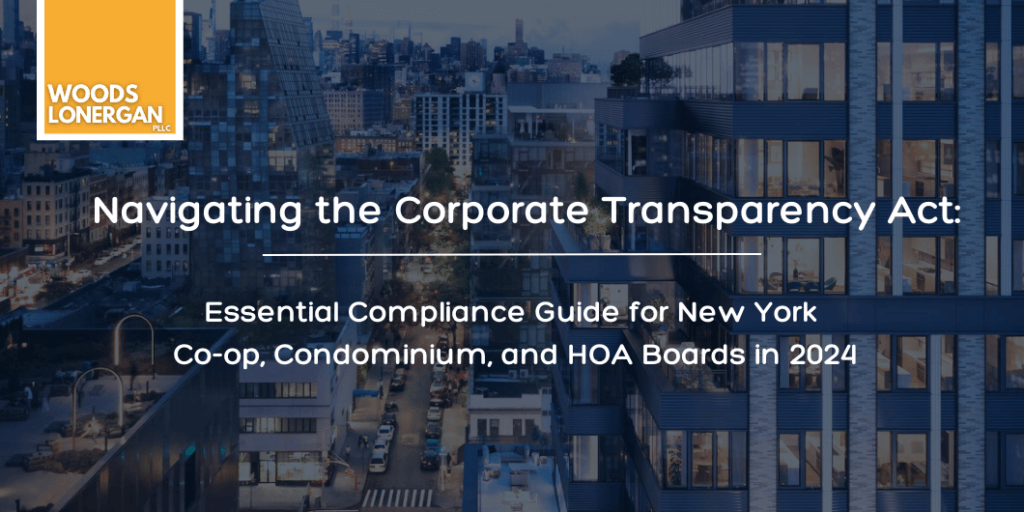
Board members of cooperatives, condominiums, and HOAs in New York face a new era of regulatory compliance with the advent of the Corporate Transparency Act (CTA), a development that requires immediate attention and strategic planning.
Woods Lonergan PLLC’s New York condominium and cooperative attorneys currently serve as general counsel to the boards of directors and managers of numerous cooperatives, condominiums and homeowners associations throughout the New York metropolitan area.
This depth of experience allows us to navigate complex regulatory landscapes and advise on best practices in board governance.
The CTA emerges as a pivotal shift in this landscape, introducing new reporting requirements that significantly impact our clients’ governance structures and operational procedures. For the latest updates on how the CTA affects NYC co-op and condo boards, including recent legal developments, see our coverage of Managing Partner Jim Woods’ insights in a Brick Underground article, “NYC Co-op and Condo boards catch a break as Corporate Transparency Act faces legal limbo“.
Understanding the Corporate Transparency Act
Enacted in 2021 and implemented in 2024, the CTA’s primary objective is to combat financial crimes such as money laundering and corruption by enhancing transparency in business ownership structures. This landmark legislation mandates that numerous entities operating within the United States, including residential communities, report specific information about their beneficial owners to the Financial Crimes Enforcement Network (FinCEN) of the U.S. Treasury Department.
Key Reporting Requirements
The CTA requires the submission of Beneficial Ownership Information (BOI) to FinCEN. For co-ops, condos, and HOAs, this entails reporting:
- The legal name of the property
- Any trade names or “doing business as” (d/b/a) designations
- The current U.S. street address of the principal place of business
- The jurisdiction of formation and date of formation
- The entity’s Taxpayer Identification Number
- Information on all beneficial owners
Who Qualifies as a Beneficial Owner?
Under the CTA, a beneficial owner is defined as an individual who either directly or indirectly:
- Exercises substantial control over the association, or
- Owns or controls at least 25% of the association’s ownership interests
In our professional assessment, all board members of co-ops, condos, and HOAs likely qualify as beneficial owners due to their substantial control over the entity. Additionally, sponsors retaining more than a 25% interest should be included in the report.
Compliance Deadlines and Reporting Frequency
The CTA establishes specific deadlines for initial reporting:
- Entities created or registered before January 1, 2024: Must file by January 1, 2025
- Entities created or registered in 2024: Must file within 90 calendar days of formation
- Entities created or registered on or after January 1, 2025: Must file within 30 calendar days of formation
It is crucial to note that while the initial report is a one-time filing, updates are required within 30 days of any changes to the reported information, including board member changes or identification document renewals.
Implications for Co-ops, Condos, and HOAs
While the CTA’s language does not explicitly mention residential communities, our legal analysis strongly suggests that cooperative corporations, condominium associations, and HOAs fall within the purview of this reporting requirement, until further notice. This interpretation is based on the fact that these entities are typically formed by filing with the Secretary of State.
Filing Process and Best Practices
FinCEN has established a dedicated BOI E-Filing website for report submissions. While self-filing is an option, we strongly recommend that boards consider engaging professional guidance from legal counsel and property management for CTA compliance, given the complexity of the requirements and the potential for significant penalties for non-compliance.
Potential Exemptions and Legal Challenges
Currently, the only exemption potentially applicable to residential communities is for entities with annual gross receipts exceeding $5 million and with more than 20 full-time employees in the United States. However, it’s important to note that industry organizations, including the Community Associations Institute (CAI), are actively pursuing legal challenges and seeking exemptions for community associations at this time.
Penalties for Non-Compliance
The CTA imposes substantial penalties for willful violations:
- Civil penalties of up to $591 per day (as of April 2024, adjusted annually for inflation)
- Criminal penalties of up to $10,000
- Potential imprisonment for up to 24 months
These penalties underscore the critical importance of timely and accurate reporting.
FAQs for New York Cooperative and Condominium Board Members
Are Condominiums Required to Submit a BOI Report?
While condominium associations in New York are initially formed via a declaration on land records, they are also required to file with the Secretary of State after formation. Therefore, we strongly recommend that all condominiums file the BOI Report to ensure compliance.
What Specific Information Is Required for Each Beneficial Owner?
The BOI Report must include each beneficial owner’s name, date of birth, residential address, and an identifying number from an acceptable identification document (such as a passport or U.S. driver’s license), along with the issuing jurisdiction of that document.
Can Our Board File the BOI Report Without Using a Third Party?
While self-filing is possible through FinCEN’s BOI E-Filing website at no cost, we recommend engaging professional assistance due to the complexities involved in monitoring compliance and the potential for significant penalties.
Are There Any Ongoing Legal Challenges to the CTA’s Requirements?
Yes, several industry organizations, including the CAI, the Real Estate Board of New York (REBNY), and the Council of New York Cooperatives and Condominiums, are actively seeking exemptions for cooperatives and condominiums from the CTA requirements.
What Should Our Board Do Given the Ongoing Legal Challenges?
Given the potential penalties for non-compliance, we recommend erring on the side of caution and proceeding with BOI report preparation and filing while staying informed about any developments regarding exemptions or legal challenges.
Final Thoughts
The Corporate Transparency Act introduces a new layer of regulatory compliance for co-op, condo, and HOA boards in New York. While the requirements may seem daunting, proactive preparation and professional legal guidance can ensure smooth compliance and protect your community from potential penalties.
At Woods Lonergan PLLC, we stand ready to provide comprehensive guidance on CTA compliance, helping your board navigate these new regulatory waters with confidence and precision. Our expertise ensures that your community not only meets its legal obligations but also strengthens its governance practices in the process.
For personalized guidance on CTA compliance or any other matters related to cooperative and condominium law, please contact us online or call our Cooperative Condominium practice group at (212) 684-2500.
Woods Lonergan PLLC represents Condominium and Cooperative Boards of directors in matters of board governance, transactions and litigation throughout New York, including Manhattan, Brooklyn, Queens, Bronx, Staten Island, Nassau, Suffolk, and Westchester Counties.
